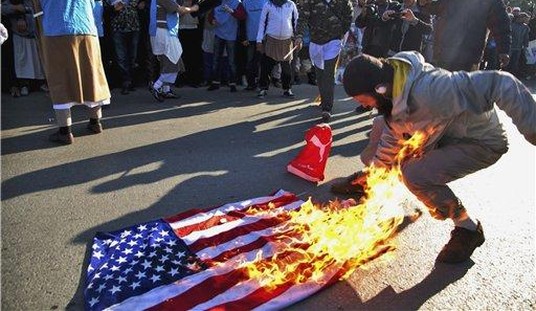The entire idea behind Iran’s proxy warfare is to have deniability so the regime can escape retribution and still position itself as the power broker that all must cater to. If the Iranians needed any reassurance that their strategy is working, they got it from Vice President Joe Biden on August 23.
In an address in Indiana to the Veterans of Foreign Wars, Biden made the remarkably ignorant and damaging statement:
Iranian influence in Iraq is minimal. It’s been greatly exaggerated.
To prove his point, Biden said that Iran had spent over $100 million to influence the last Iraqi election, and “they utterly failed.” Biden is right that the election was a major defeat for Iran, and the regime has lost the war for the hearts and minds of the Iraqis, but Iran’s campaign is much more than a popularity contest.
The pro-Iran religious Shiite parties may have been walloped in the election, but the two top vote-getters — the blocs of Iyad Allawi and Prime Minister Nouri al-Maliki — are still forced to jockey for their support in forming the next government. In effect, because of Allawi and al-Maliki’s failure to reach a compromise, the parties tied to Iran get the deciding vote. Al-Maliki is actively courting the Supreme Islamic Council of Iraq, and Allawi has gone to Damascus to meet with Bashar Assad and Moqtada al-Sadr, the Iranian-backed militia leader who led a revolt against coalition forces and the Iraqi government. Sadr is being educated in Iran so he can be declared an ayatollah.
The number one problem facing Iraq is still security, and it is here that Iran continues to exercise its might in the hopes of being granted veto power over the fate of its neighbor. Iranian involvement is so steep that American generals have consistently spoken out about the problem, probably as a way of giving their political leaders a discreet nudge to do something about it. General Ray Odierno complained in July that Iran was using three extremist Shiite groups to carry out attacks on U.S. bases: Ketaib Hezbollah, the League of the Righteous, and the Promise Day Brigade, which split off from Moqtada al-Sadr’s Mahdi Army. These forces also actively fight the Iraqi government. Iranian munitions continue to be seized around the country, and Abu Dura — a slayer of thousands of Sunnis with brutality that has given him near horror-movie villain status — has returned to Iraq from his safe harbor in Iran.
The Iranian regime barely hides its fingerprints on these radical Shiite elements, sending the Iraqis and their Western allies the message that Iran is the one whose wishes must be granted. The regime is more careful to conceal its ties to al-Qaeda. General Petraeus said in March that al-Qaeda “continues to use Iran as a key facilitation hub, where facilitators connect al-Qaeda’s senior leadership to regional affiliates.” In other words, al-Qaeda is connected to its affiliates in places like Iraq via Iran. The Iraqi intelligence service has reached the same conclusion, reporting that Iran is sending its terrorist allies to Iraq through other countries like Syria to cloak their responsibility.
The sectarian violence that continues to plague Iraq is also partly the result of Iran’s playing of both sides. It is no secret that Iran supports the Shiite end of the violence, but the regime also is involved in Sunni attacks on Shiites.
On January 9, 2008, the Treasury Department blacklisted Ahmed Forouzandeh, a brigadier general in the Revolutionary Guards’ elite al-Quds Force. Forouzandeh’s Iranian intelligence staff was attacking Iraqi officials and security personnel, and in mid-February 2007, they were commanded to attack Shiites in order to provoke sectarian violence. Of course, the U.S. still refuses to drop the myth that Islamic extremists of different ideologies don’t work together, causing the Iraqi foreign minister to criticize America’s close-mindedness on the issue.
Furthermore, the Iraqi intelligence chief resigned after massive bombings shook Baghdad in August 2009. He had reportedly received proof of Iranian involvement, but Prime Minister al-Maliki told his staff not to officially accuse Iran. This continued a long-standing practice of only referring to “neighbors” when discussing the terrorists’ backers.
If Iranian influence is so “minimal” as Biden said, then why is there such a reluctance to state the obvious truth?
The August 2009 bombings carry another lesson. The Iraqis had enough of Syrian support for terrorism in their country and took matters into their own hands. They bluntly threatened the Assad regime and released proof after proof of Syrian sponsorship of terrorists, including al-Qaeda, and publicly blamed Syria for the Baghdad bombings. They even tried to get international support for a UN tribunal to prosecute Syrian officials and terrorists harbored in Syria (which the U.S. disappointingly did not support).
Terrorism in Iraq fell 75 percent during the ensuing diplomatic crisis, proving two things: Syria and Iran are the primary instigators of the violence in Iraq and their behavior can be influenced through exposure and confrontation.
The implication of Biden’s statement is that Iran can sleep at night knowing the U.S. doesn’t recognize the depth of its role, and therefore won’t do anything. The Iranians continue this destructive activity simply because it works and it’s worth it to them. They’d be crazy to stop with this lax and non-responsive U.S. attitude.
And Joe Biden’s remark will only further persuade Iran that meddling in Iraq is a risk-free investment.









Join the conversation as a VIP Member